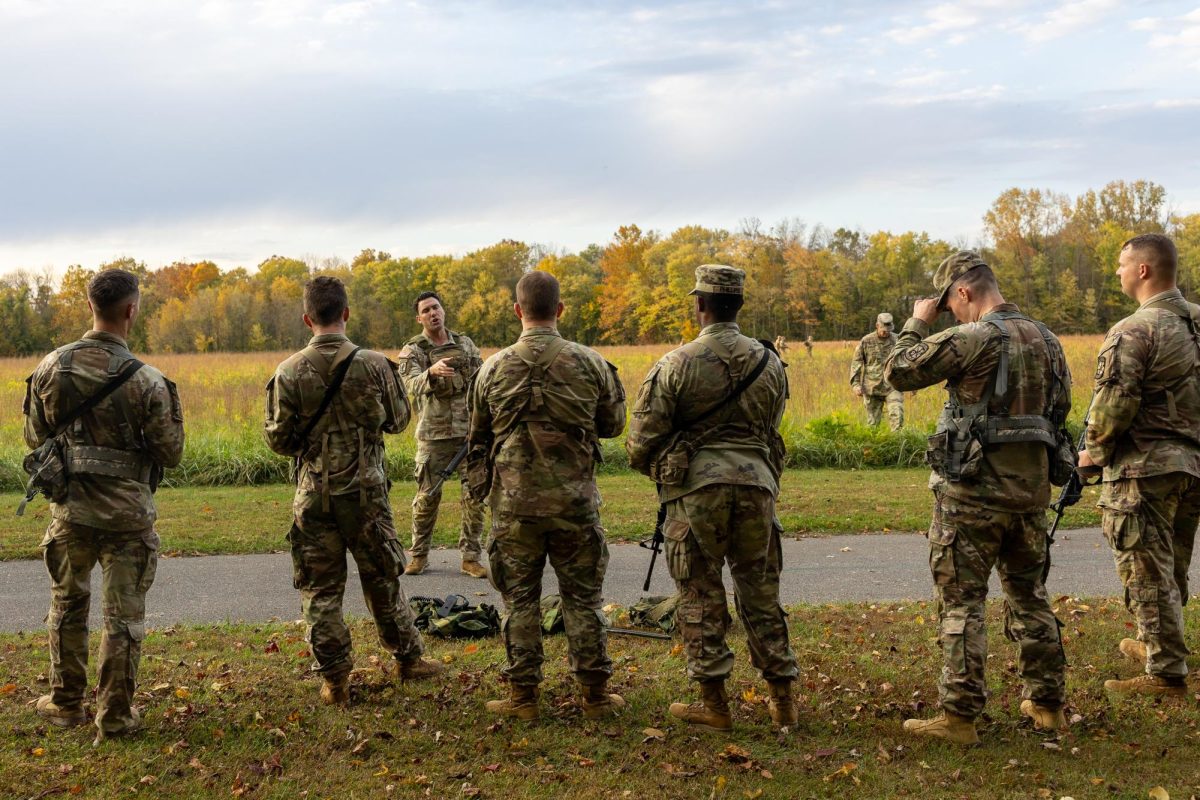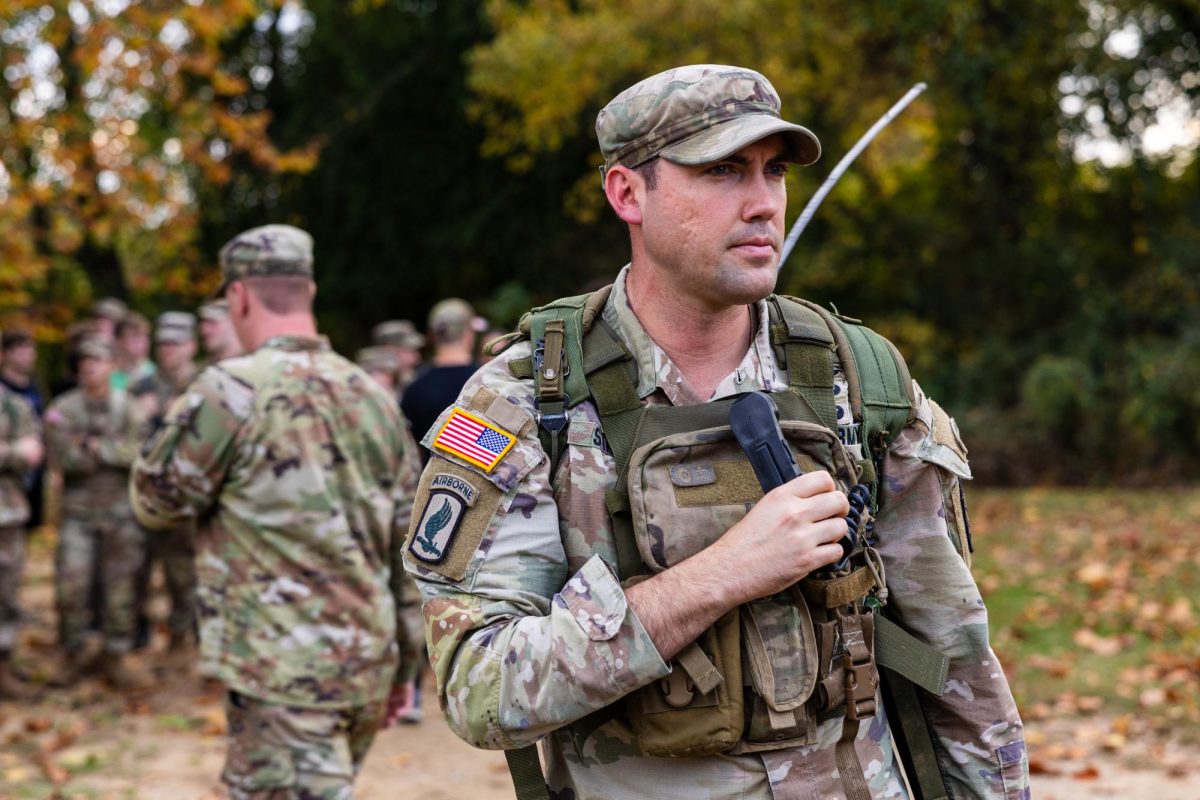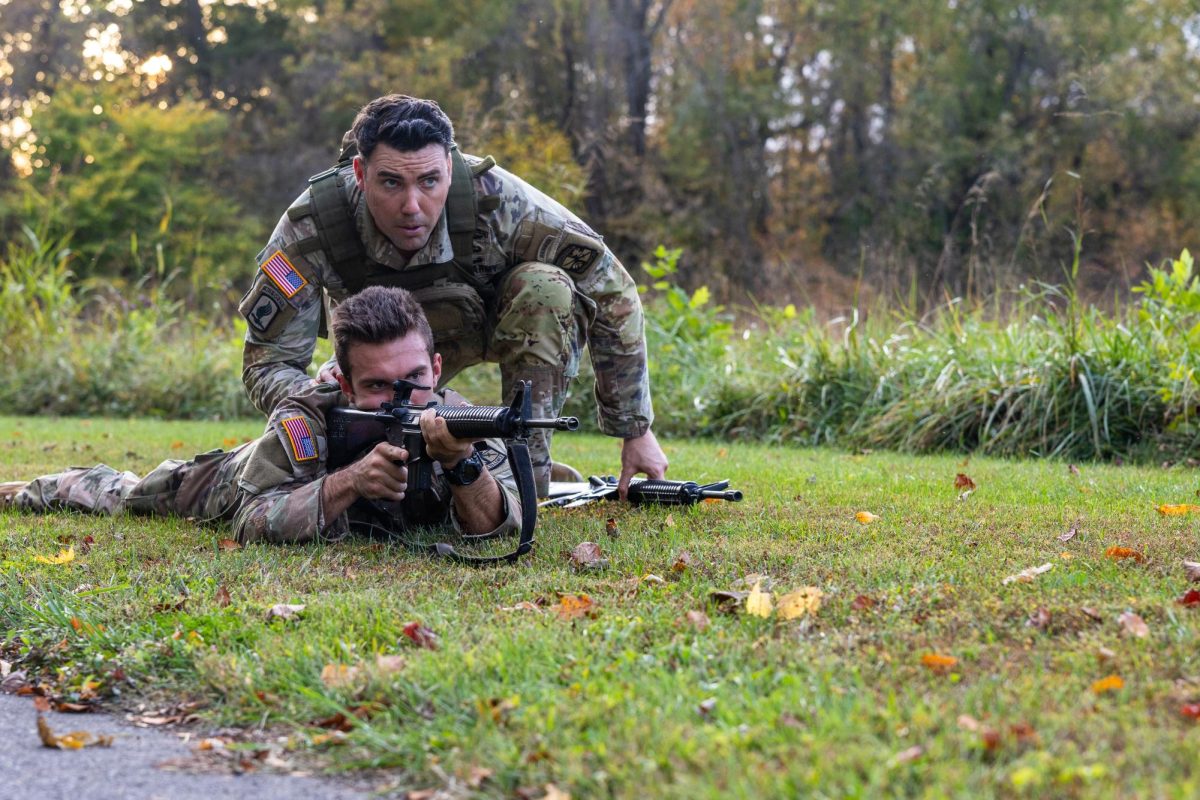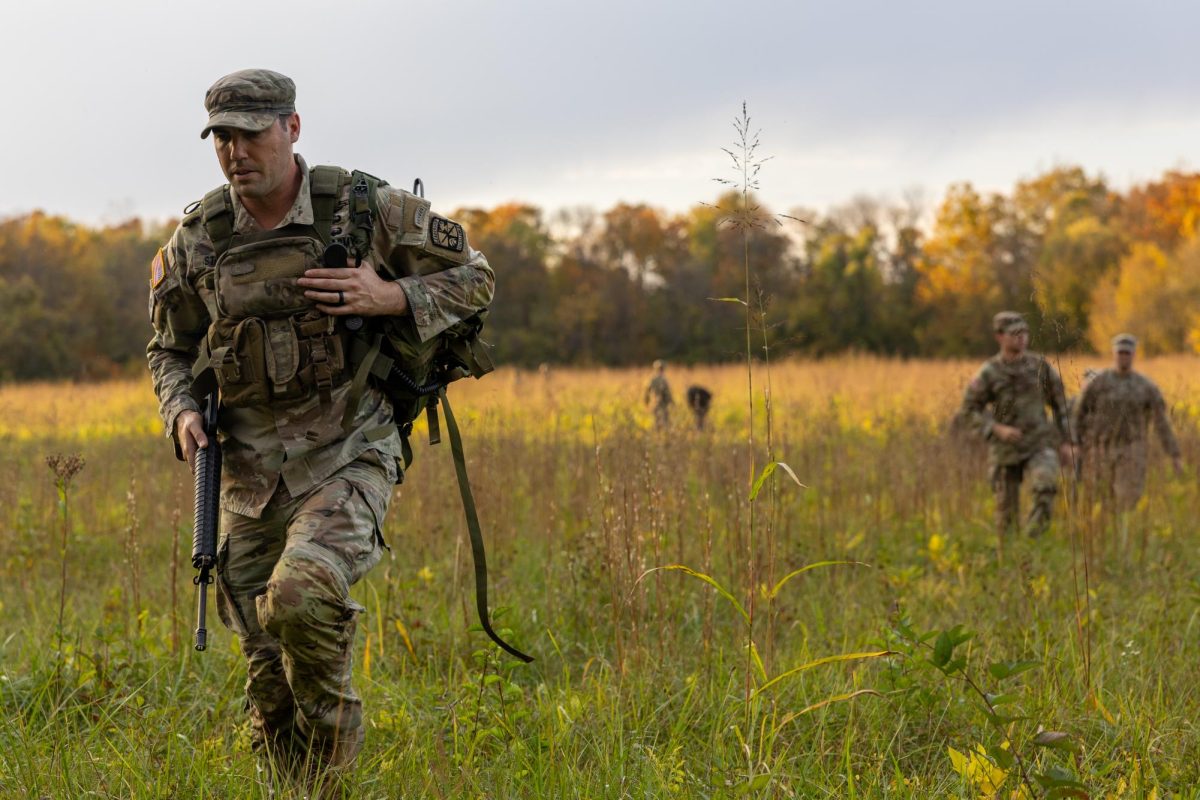This year’s homecoming falls on Veterans Day, with a theme of Big Red, White and Blue, which raises the question of what it means to be a veteran while on campus.
For six consecutive years, WKU has been ranked by Military Times Edge magazine as “Best for Vets 4-year College.” With numerous military programs, such as the Reserve Officers’ Training Corps, WKU provides an education opportunity for veterans and those planning to enlist by supplying 50 online degree programs and a military tuition rate of $250 per credit hour.
Daniel Vuleta, a senior criminology major and current WKU ROTC Cadet Battalion Commander, took advantage of the benefits of being part of the ROTC program. He credits the military program for being what brought him to WKU.
“How I got into this was I got a three-year national scholarship, and that brought me to WKU,” Vuleta said. “I had an academic scholarship on top of it so I was able to get my entire college paid for.”
While beneficial and something many students would want to be a part of, Vuleta highlighted the intensity of the program.
“You go through ROTC, which is you’re evaluated through your four years of college while taking the military science classes and getting the military science minor,” Vuleta said. “And then at the end of your junior year, you take your final examination at CST, and that’s like your final evaluation.”
CST is the U.S. Army Cadet’s Command capstone training event. Here, cadets will attend activities preparing them for the Army such as land navigation, confidence training and maneuver training. Those in attendance are already contracted with the Army and most are in their junior or senior year.
“You get ranked and stacked in something that’s called an OML, Order of Merit list, with the entire nation,” Vuleta said. “And that’s how you can kind of select your branch that you want to do, so, like, aviation, or logistics or whatever you want to do. And your senior year, which is what I am in now, you find your branch, and then you commission as a second lieutenant in either active duty, national guard or reserve.”
Vuleta is aiming to be branched under aviation. If granted, he will go into a Basic Officer Leadership Course and then go into flight school to train to become a helicopter pilot on various different Army airframes. Progressing further in the branch will lead him
to become a section leader, working behind the scenes on planning and leadership tasks.

However, those dreams still require four years of consistent training and early mornings. Vuleta is in year four and still has to continue the routine that comes with being in the ROTC.
“A typical day is we have PT Tuesday, Wednesday, and Thursday,” Vuleta said. “And probably my busiest day is Thursday because that’s when we also have our lab.”
A lab day for an ROTC cadet goes loosely like this: a 5:30 a.m. wake-up time, physical training around 5:45 a.m. on South Lawn or at the top of the Hill, a return home around 7 a.m. to prepare for the day, going to different classes scheduled throughout the day, and, for Vuleta, going to his job as a desk assistant in the ROTC office at 9:30 a.m.
A busy morning is not something cadets are unfamiliar with, but for Vuleta, the constant busyness transfers to the afternoon as well. As a senior ROTC cadet and Cadet Battalion Commander, a large sum of responsibility is placed upon his and other seniors’ shoulders.
Being on the leadership team means attending staff meetings where they discuss what needs to be done for the week and plans for upcoming events, like Veterans Day. Vuleta attends these meetings while other seniors, those not on the leadership team, facilitate training for the underclass cadets. Their main priority is to guide and help them learn the skills and tips they’ll need to make it through their next few years of ROTC training.
While to most it can seem like a stressful program to be a member of, Vuleta recognizes it for the benefits it gave him that he otherwise may have not had.
“ROTC has definitely … it’s given me a lot more confidence, I would say, in a lot of ways,” Vuleta said. “I feel like the main focus of ROTC is, yes, you want to be, you know, intelligent, and we focus on tactics, but that’s just a way to understand leadership.”
One quality that many may not realize about ROTC, however, is about community and the family-like bonds you build.
“The thing that I really enjoy is those personal relationships you have with people,” Vuleta said. “Like, that personal tact that you get, you know, being able to communicate with people, express yourself. That’s something that I don’t know where else I would have gotten it.”
Vuleta’s day, however, differs from that of a current veteran on campus.
Brandon Dunn is a WKU freshman and veteran who enlisted in 2019, five years after graduating high school. After leaving the military, he decided he no longer wanted to be involved in the military or the factory he worked for before enlisting.
Dunn did not know how to begin the enrollment process at WKU and how to take advantage of his military benefits. A simple Google search changed the course of his educational career.

“In order to do that, I Googled WKU and the Veterans Upward Bound popped up,” Dunn said. “And I reached out to Marc [Hamilton], and then Marc kind of helped me sign up for my benefits through the VA. And he’s been a big help every step of the way.”
The Office of Veterans Affairs assists veterans in accessing their benefits, advising students about procedural requirements and certifying student enrollment to the Department of Veterans Affairs. The U.S. Department of Veterans Affairs determines eligibility for the opportunities made available by the Veterans Affairs Office.
Veterans Upward Bound (VUB)is one of the many financial options offered to veterans. VUB is a part of the federal TRIO program – a federally funded program motivating and pushing students from diverse backgrounds to pursue a college degree – and aims to assist military Veterans in developing academic skills. It serves to increase the enrollment rates.
Along with this aid, others are offered and help cover Veterans’ tuition.
“Coming from a military back- ground, I automatically got a GI Bill,” Dunn said.
The GI Bill is awarded to those who completed four years of military service and were released honorably. The bill covers a student’s entire cost of tuition and fees at public in-state schools or job training.
“I’m actually saving my GI Bill and not using it because I acquired a few injuries while in the military, and I’m disabled,” Dunn said. “So I have a 90% percent disability rate. Through the Veterans Affairs, I’m able to use what they call Chapter 31, it’s Veterans Readiness and Employment.”
After signing up for Chapter 31, Dunn was able to have his schooling paid for while also receiving an additional payment to continue attending school- roughly $1,300 a month. Dunn used this to pay his rent so he could remain unemployed and focus primarily on school.
Dunn encourages students looking for a military career or veterans thinking about returning to school to reach out to the many military organizations on WKU’s campus.
“They’ve been nothing but a great help to me,” Dunn said. “And, they’ll provide you with scholarships. They’ll provide you with supplies, equipment, whatever you need to make that leap and get your education.”
William Stanley, a junior, is a veteran who took the leap to enroll at WKU and take advantage of its ROTC program.
Stanley served in the Army for 13 years as an infantryman in the 173rd Airborne Brigade. He was a Sergeant First Class who received orders from Italy to be a military science instructor or ROTC cadre member at the University of Maryland through the Master Educator Course. The program gives people a level of teaching such as that of a college professor.
“I was able to go to the Master Educator Course and it helped me out a lot, and it gave me a lot of credits towards my degree,” Stanley said. “So I was able to enroll at WKU and go green to gold is what we call it.”
With a family of his own – a wife and two kids – being a part of the ROTC as a veteran and being a full-time student, balancing it all could be difficult. But not for Stanley.
“I think it’s very manageable,” Stanley said. “I think that job experience in general and being a little older helps with staying disciplined in studies. I don’t think it’s very hard [to manage].”
Stanley said the number one priority of the ROTC program is letting cadets focus on their GPA more than anything. He appreciated how easy it is to communicate to program leaders if there is anything happening personally or academically.
However, Stanley recognizes that his prior experiences in the Army have set him apart from the other cadets. He commented on the growth that takes place in ROTC and the growth that he experiences outside of the program, in the Army and in his personal life. “There’s a lot of growth that happens,” Stanley said. “I mean, with that, there are failures that you grow from, there are experiences you grow from. There is a lot of growth that happens within the military and developing leadership with everyone.”
Despite this, the level of difficulty is still there, and cadets and veterans have to work to an almost perfect standard. The skills and lessons learned in the ROTC help prepare members for leadership positions in the Army.
“A lot of the course material from the lead courses helps me also in the military,” Stanley said. “So I learn a lot of stuff from organizational leadership that I can apply to being a leader in the military. That kind of goes hand in hand.”
Being contracted into the Army through the ROTC program is not immediate, and will not happen unless you are willing to make that commitment. The decision does not need to be made until your junior or senior year.
Those part of the ROTC and veterans around campus attribute their routine-like days and ability to excel in their educational careers to the military programs at WKU.
“I joined the Army at 18 years old, and so I think for most of my life, I think that what I missed was the college experience,” Stanley said. “Every day I walk or step on campus, it’s a very redeeming feeling for me. And, for me, it’s an opportunity that I never got to have that I get to live right now.”

Stanley highlighted the ROTC for being a place where many relationships are formed.
“I think it’s an adventure,” Stanley said. “You make great friends here… It’s just, say you want to do it just for the friends, it’s a great place to do so.”
Serving not only as a sanctuary for veterans, but as a place that becomes a second home for many, is what WKU and its military programs on campus strive to do.
“I’m very appreciative of this moment in my life,” Stanley said.
News Reporter Shayla Abney can be reached at shayla.abney577@topper. wku.edu


